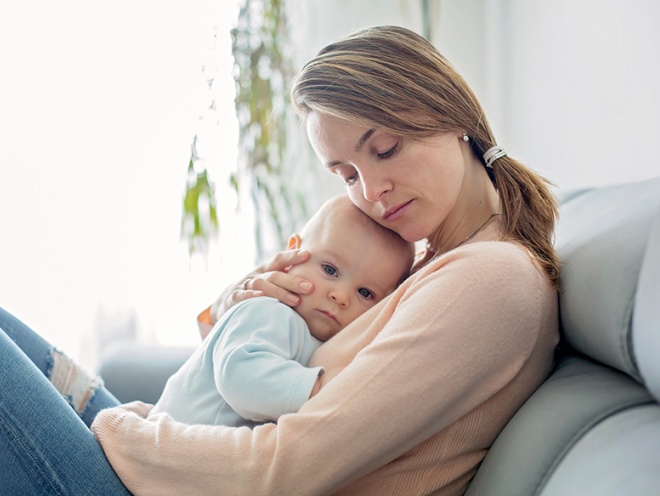Have you heard others talk about parent-led parenting and wondered what it is? We explore the theory and practice to help you decide if it’s right for you.
So what exactly is parent-led parenting?
This approach sits at the opposite end of the spectrum to attachment parenting. Parents set the family schedule, including the baby’s routine (when they feed, sleep and play). Some feel it is the most responsive way to address the needs of the whole family. Parent-led parenting is also called limit-setting parenting.
Parent-led parenting means not having to work out what baby needs because the routine tells the parent what the problem is likely to be. Parent-led routines claim to prevent crying because they ensure the baby is fed often enough and gets enough daytimes naps. But the claims made are not supported by evidence (Harries and Brown, 2019).
It’s hard to disagree that as we get older, we need boundaries. Otherwise, your little one might end up eating an entire packet of biscuits in one sitting, and binge watching the whole of CBeebies. Setting limits has also been shown to improve children’s behaviour (Kochanska et al, 2008).
In studies of older children (7 years and older) who have set bedtimes, the results are clear. Those with a set bedtime are better behaved and less likely to suffer from mental health problems, including depression and suicidal thoughts (Short et al, 2011; Kelly et al, 2013).
Parenting books
While various authors support parent-led parenting (Ford, 2006; Mead, 2018; Wolfe, 2019; Hall, 2020), there is still little evidence to support their claims (Harries and Brown, 2019). Any effectiveness of the methods does depend on the age of the baby.
Individual studies may suggest leaving six- to eight-month-old babies to cry at bedtime improves their sleep (Gradisar et al, 2016). But a review of all the evidence found that sleep training does not improve outcomes for mums or babies (Douglas and Hill, 2013).
There is evidence that leaving a very small baby to cry can adversely affect how their brain develops (Ludington-Hoe et al, 2002; Sunderland and Panksepp, 2006). So strict routines may potentially cause problems down the line. See our articles about sleep training and whether to leave a baby to cry.
Many parents choose to adopt a flexible routine that allows them to respond to their baby’s needs while still using predictable periods of time for feeding and napping. One such example is the concept of ‘wake windows’, whereby the parent ensures the baby naps at regular intervals to prevent overtiredness. Although there is no research into ‘wake windows’ it is based on the physiological need for sleep, which increases the longer babies are awake for (Whittingham and Douglas, 2014).
Some people claim the benefits to the baby of routines include:
- Helping babies develop their internal clocks.
- Reducing crying. How? Because once your baby is in a routine, it’s more likely you can quickly work out what’s wrong. Knowing how much they’ve fed, played and slept takes the guesswork out of a diagnosis.
- More sleep for longer and sooner because you’re not being woken to demand feed (Sadeh at al, 2010). One study found that at three months old, babies whose parents waited a minute before responding to night waking were more likely to sleep for five or more hours a night without waking or crying (St James-Roberts et al, 2017).
- Guaranteeing your baby gets frequent feeds might remove the chance of underfeeding your little one (NHS, 2018). But the snag is that feeding on a routine reduces breastmilk supply whereas feeding on demand optimises breastmilk production (NHS, no date).
Some people claim the benefits to the parent of routines include:
- Helping parents understand the reason for crying.
- A degree of free time in the evening for parents to rest and connect with each other.
- Going back to work – as many of us have to – is easier as there’s already a routine established.
What does parent-led parenting involve?
At the heart of parent-led parenting is routine. One example of a flexible routine is E(eat) A(activity) S(sleep) Y(you time). This is a set pattern of events in the baby’s day, which parents can repeat throughout the day at regular intervals without adhering to the clock (Hogg and Blau, 2001).
What exactly is in the routine?
To start with, babies don’t have that varied a to-do list. Eat, sleep, poo, communicate and learn. Parent-led parenting provides a little guidance at the start.
Things to plan:
- Regular, structured feeding and daytime nap times.
- Scheduling short activity periods after feeds, followed by naps to reduce over-stimulation.
- Using a bedtime routine from around six to eight weeks old. This could include:
- having a bath
- changing into night clothes and a fresh nappy
- putting them to bed (in the same room as you to reduce the chance of SIDS)
- reading a bedtime story
- dimming the lights in the room to create a calm atmosphere
- giving a goodnight kiss and cuddle
- singing a lullaby or having a white noise machine you can turn on when you've put your baby to bed.
(NHS, 2021)
Why the controversy?
Critics are concerned that this method doesn’t meet the needs of the baby.
Parent-led supporters believe the health of the family needs to be considered. This includes parents’ mental health.
Many parents tell us the ability to predict the structure of your day can be useful. Particularly if and when going back to work creeps in or when the demands of parenting (and lack of sleep) become overwhelming. Poor parental mental health can negatively affect children (Barnes and Theule, 2019), and parent-led parenting can provide vital respite.
Some elements don’t sit comfortably with many. Some disagree with only cuddling your baby when they need it, not when you do. And many just can’t face leaving their baby to cry.
As with attachment, mindful or positive parenting styles, a few of the ideas might work for you, but don’t feel you have to slavishly follow any of them. It's really about finding your own parenting style.
This page was last reviewed in March 2022.
Further information
For more advice and ideas when it comes to all aspects of parenting, see our other articles on parenting styles, such as our one on the most popular styles and how to identify yours, through to how to raise my child to be happy, confident and considerate.
Our support line offers practical and emotional support with feeding your baby and general enquiries for parents, members and volunteers: 0300 330 0700.
You might find attending one of NCT's New Baby groups helpful as they give you the opportunity to explore different approaches to important parenting issues with a qualified group leader and other new parents in your area.
Make friends with other parents-to-be and new parents in your local area for support and friendship by seeing what NCT activities are happening nearby.
Barnes J, Theule J. (2019) Maternal depression and infant attachment security: a meta-analysis. Infant Ment Health J. 40(6):817-834. Available at: https://doi.org/10.1002/imhj.21812
Ford G. (2006) The New Contented Little Baby Book. Vermillion, London.
Gradisar M, Jackson K, Spurrier NJ, Gibson J, Whitham J, Williams AS, et al. (2016) Behavioral interventions for infant sleep problems: a randomized controlled trial. Pediatrics. (137)6:e20151486. Available at: https:doi.org/10.1186/s12887-015-0492-7
Hall T. (2020) Save our Sleep. Vermilion, London.
Douglas PS, Hill PS. (2013) Behavioural sleep interventions in the first six months of life do not improve outcomes for mothers or infants: a systematic review. Dev Behav Paediatr. 34(7):497-507. Available at: https://doi.org/10.1097/DBP.0b013e31829cafa6
Harries V, Brown A. (2019) The association between baby care books that promote strict care routines and infant feeding, night-time care, and maternal-infant interactions. Matern Child Nutr. 15(4):e12858. Available at: https://doi.org/10.1111/mcn.12858
Hogg T, Blau M. (2001) Secrets of the Baby Whisperer. Vermillion, London.
Kelly Y, Kelly J, Sacker A. (2013) Changes in bedtime schedules and behavioral difficulties in 7 year old children. Pediatrics. (132)5:e1184-93. Available at: https://doi.org/10.1542/peds.2013-1906
Kochanska G, Aksan N, Prisco TR, Adams EE. (2008) Mother–child and father–child mutually responsive orientation in the first 2 years and children's outcomes at preschool age: mechanisms of influence. Child Dev. 79:30-44. Available at: https://doi.org/10.1111/j.1467-8624.2007.01109.x
Ludington-Hoe SM, Cong X, Hashemi F. (2002) Infant crying: nature, physiologic consequences, and select interventions. Neonatal Netw. 21(2):29-36. Available at: https://doi.org/10.1891/0730-0832.21.2.29
Mead C. (2018) 7am to 7pm Sleeping Baby Routine: The No Cry Plan to Help your Baby Sleep Through the Night. Vermilion, London.
NHS. (2018) Breastfeeding: is my baby getting enough milk? Available at: https://www.nhs.uk/conditions/baby/breastfeeding-and-bottle-feeding/bre… [Accessed 17th March 2022]
NHS. (2021) Helping your baby to sleep. Available at: https://www.nhs.uk/conditions/pregnancy-and-baby/getting-baby-to-sleep/#establishing-a-baby-bedtime-routine [Accessed 25th February 2022]
NHS. (no date) Breastfeeding challenges. Available at: https://www.nhs.uk/start4life/baby/feeding-your-baby/breastfeeding/brea… [Accessed 25th February 2022]
Sadeh A, Tikotzky L, Scher A. (2010) Parenting and infant sleep. Sleep Med Rev. 14(2):89-96. Available at: https://doi.org/10.1016/j.smrv.2009.05.003
Short MA, Gradisar M, Wright H, Lack LC, Dohnt H, Carskadon MA. (2011) Time for bed: parent-set bedtimes associated with improved sleep and daytime functioning in adolescents. Sleep. 34(6):797–800. Available at: https://doi.org/10.5665/SLEEP.1052
St James-Roberts I, Roberts M, Hovish K, Owen C. (2017) Video evidence that parenting methods predict which infants develop long night-time sleep periods by three months of age. Prim Health Care Res Dev. 18(3):212-226. Available at: https://doi.org/10.1017/S1463423616000451
Sunderland M, Panksepp J. (2006) The Science of Parenting. DK Publishing, London.
Whittingham K, Douglas P. (2014) Optimizing parent-infant sleep from birth to 6 months: a new paradigm. Infant Ment Health J. 35(6):614-623. Available at: https://doi.org/10.1002/imhj.21455
Wolfe L. (2019) The Baby Sleep Solution: The Stay-and-Support Method to Help Your Baby Sleep Through the Night. Headline Home, London.






